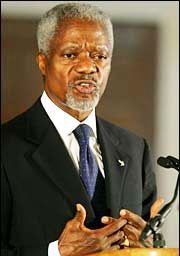Annan urges swift action on Darfur crisis
May 19, 2006 (PARIS) — U.N. Secretary-General Kofi Annan said there was not a “second to lose” if the world was to save hundreds of thousands of people in Sudan’s conflict-ravaged Darfur region from starvation and disease.
 “The region is undergoing the worst humanitarian crisis gripping the planet,” Annan said in an opinion piece in the French daily Le Figaro published on Friday.
“The region is undergoing the worst humanitarian crisis gripping the planet,” Annan said in an opinion piece in the French daily Le Figaro published on Friday.
“Without massive and immediate support relief organizations will not be able to continue their work, and hunger, malnutrition and sickness will claim hundreds of thousands of victims,” he wrote.
Annan said an agreement signed on May 5 in Nigeria by the Sudanese government and the main rebel group in Darfur would help restore peace but tensions remained high and other rebel groups had failed to sign the peace process.
An under-funded and under-equipped African Union (AU) force monitoring a truce in Darfur has been unable to stop militia attacks on civilians caught in the crossfire of a conflict which has claimed tens of thousands of lives in the past three years.
The hacking to death of an African Union interpreter during a visit by a U.N. aide official at a camp for Darfur refugees underlined the seriousness of the situation, Annan said.
“There is not a second to lose,” he said.
Sudan appeared on Thursday to ease its opposition to the arrival of a U.N. force, saying high-level talks with the United Nations were starting which would open a “new window” in relations.
Annan said in the meantime it was important that the 7,000-strong AU peacekeeping mission in Darfur be supported and fortified.
“For the moment, there is only one force on the ground capable of ensuring this protection, that is the African Union Mission in Sudan,” Annan wrote.
“Our priority should be to consolidate this force to be able to enforce the peace accord and offer real security to refugees.”
Two rebel groups who refused to sign the Abuja peace deal have been given two weeks to sign the deal or face sanctions from the African Union.
The international community sees the accord as the only hope of ending the war but diplomats fear it will fail to stop the violence if only one rebel faction supports it.
The Darfur crisis began in February 2003 when two rebel groups rose up against the authorities, saying the government had neglected the arid region and was arming Arab militia against civilians.
(Reuters)
